- Clone
- 11A8 (See other available formats)
- Regulatory Status
- RUO
- Other Names
- DNAM-1, PTA1, TLiSA1
- Isotype
- Mouse IgG1, κ
- Ave. Rating
- Submit a Review
- Product Citations
- publications
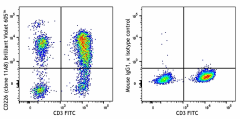
-

Human peripheral blood lymphocytes were stained with CD3 FITC and CD226 (clone 11A8) Brilliant Violet 605™ (left) or mouse IgG1, κ Brilliant Violet 605™ isotype control (right).
| Cat # | Size | Price | Save |
|---|---|---|---|
| 338323 | 25 tests | ¥43,560 | |
| 338324 | 100 tests | ¥91,960 |
DNAM-1 (CD226) is a ~65 kD glycoprotein expressed on cell surface of T cells, NK cells, monocytes/macrophages, platelets and megakaryocytes and a subset of B cells and a member of the immunoglobulin (Ig)-superfamily containing 2 Ig-like domains of the V-set. The ligands for CD226 are the poliovirus receptor (CD155) and its family member nectin-2 (CD112), which are broadly expressed on epithelial, endothelial and neuronal cells. CD226 is physically associated with LFA-1 in NK cells and activated T cells, and involved in LFA-1-mediated signaling.
Product DetailsProduct Details
- Verified Reactivity
- Human
- Reported Reactivity
- African Green, Baboon, Cynomolgus, Rhesus
- Antibody Type
- Monoclonal
- Host Species
- Mouse
- Formulation
- Phosphate-buffered solution, pH 7.2, containing 0.09% sodium azide and BSA (origin USA).
- Preparation
- The antibody was purified by affinity chromatography and conjugated with Brilliant Violet 605™ under optimal conditions.
- Concentration
- Lot-specific (to obtain lot-specific concentration and expiration, please enter the lot number in our Certificate of Analysis online tool.)
- Storage & Handling
- The antibody solution should be stored undiluted between 2°C and 8°C, and protected from prolonged exposure to light. Do not freeze.
- Application
-
FC - Quality tested
- Recommended Usage
-
Each lot of this antibody is quality control tested by immunofluorescent staining with flow cytometric analysis. For flow cytometric staining, the suggested use of this reagent is 5 µl per million cells in 100 µl staining volume or 5 µl per 100 µl of whole blood.
Brilliant Violet 605™ excites at 405 nm and emits at 603 nm. The bandpass filter 610/20 nm is recommended for detection, although filter optimization may be required depending on other fluorophores used. Be sure to verify that your cytometer configuration and software setup are appropriate for detecting this channel. Refer to your instrument manual or manufacturer for support. Brilliant Violet 605™ is a trademark of Sirigen Group Ltd.
Learn more about Brilliant Violet™.
This product is subject to proprietary rights of Sirigen Inc. and is made and sold under license from Sirigen Inc. The purchase of this product conveys to the buyer a non-transferable right to use the purchased product for research purposes only. This product may not be resold or incorporated in any manner into another product for resale. Any use for therapeutics or diagnostics is strictly prohibited. This product is covered by U.S. Patent(s), pending patent applications and foreign equivalents. - Excitation Laser
-
Violet Laser (405 nm)
- Application Notes
-
Additional reported applications include: block NK cell-mediated lysis.
-
Application References
(PubMed link indicates BioLegend citation) -
- Fuchs A, et al. 2004. J. Immunol. 172:3994.
- Product Citations
-
- RRID
-
AB_2721542 (BioLegend Cat. No. 338323)
AB_2721543 (BioLegend Cat. No. 338324)
Antigen Details
- Structure
- Ig domain containing adhesion molecule
- Distribution
-
Peripheral blood T cells, NK cells, monocytes/macrophages, platelets and megakaryocytes and a subset of B cells
- Function
- Receptor involved in intercellular adhesion, lymphocyte signaling, cytotoxicity and lymphokine secretion mediated by cytotoxic T-lymphocyte (CTL) and NK cell
- Interaction
- Interacts with LFA-1.
- Ligand/Receptor
- PVR (CD155) and Nectin-2 (CD112)
- Cell Type
- B cells, Macrophages, Megakaryocytes, Monocytes, NK cells, Platelets, T cells
- Biology Area
- Immunology
- Molecular Family
- CD Molecules
- Antigen References
-
1. Shibuya A et al. 1996. Immunity 4:573.
2. Tahara-Hanaoka S et al. 2004. Int. Immunol. 16:533.
3. Pende D et al. 2005. Mol. Immunol. 42:463. - Gene ID
- 10666 View all products for this Gene ID
- UniProt
- View information about CD226 on UniProt.org
Related Pages & Pathways
Pages
Related FAQs
Other Formats
View All CD226 Reagents Request Custom Conjugation| Description | Clone | Applications |
|---|---|---|
| Purified anti-human CD226 (DNAM-1) | 11A8 | FC |
| FITC anti-human CD226 (DNAM-1) | 11A8 | FC |
| PE anti-human CD226 (DNAM-1) | 11A8 | FC |
| APC anti-human CD226 (DNAM-1) | 11A8 | FC |
| PerCP/Cyanine5.5 anti-human CD226 (DNAM-1) | 11A8 | FC |
| PE/Cyanine7 anti-human CD226 (DNAM-1) | 11A8 | FC |
| APC/Fire™ 750 anti-human CD226 (DNAM-1) | 11A8 | FC |
| Brilliant Violet 785™ anti-human CD226 (DNAM-1) | 11A8 | FC |
| Brilliant Violet 605™ anti-human CD226 (DNAM-1) | 11A8 | FC |
| PE/Dazzle™ 594 anti-human CD226 (DNAM-1) | 11A8 | FC |
| Biotin anti-human CD226 (DNAM-1) | 11A8 | FC |
| Brilliant Violet 510™ anti-human CD226 (DNAM-1) | 11A8 | FC |
| Alexa Fluor® 647 anti-human CD226 (DNAM-1) | 11A8 | FC |
| Brilliant Violet 421™ anti-human CD226 (DNAM-1) | 11A8 | FC |
| Brilliant Violet 711™ anti-human CD226 (DNAM-1) | 11A8 | FC |
| TotalSeq™-A0368 anti-human CD226 (DNAM-1) | 11A8 | PG |
| TotalSeq™-C0368 anti-human CD226 (DNAM-1) | 11A8 | PG |
| TotalSeq™-B0368 anti-human CD226 (DNAM-1) | 11A8 | PG |
| TotalSeq™-D0368 anti-human CD226 (DNAM-1) | 11A8 | PG |
Customers Also Purchased
Compare Data Across All Formats
This data display is provided for general comparisons between formats.
Your actual data may vary due to variations in samples, target cells, instruments and their settings, staining conditions, and other factors.
If you need assistance with selecting the best format contact our expert technical support team.
-
Purified anti-human CD226 (DNAM-1)

Human peripheral blood lymphocytes were stained with CD3 APC... -
FITC anti-human CD226 (DNAM-1)

Human peripheral blood lymphocytes were stained with CD3 APC... -
PE anti-human CD226 (DNAM-1)
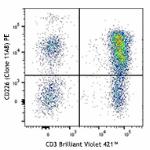
Human peripheral blood lymphocytes were stained with CD3 Bri... 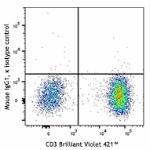
-
APC anti-human CD226 (DNAM-1)
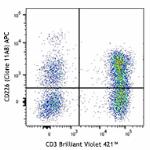
Human peripheral blood lymphocytes were stained with CD3 Bri... 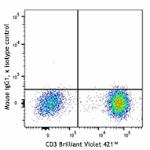
-
PerCP/Cyanine5.5 anti-human CD226 (DNAM-1)

Human peripheral blood lymphocytes were stained with CD3 Bri... -
PE/Cyanine7 anti-human CD226 (DNAM-1)

Human peripheral blood lymphocytes were stained with CD3 Bri... -
APC/Fire™ 750 anti-human CD226 (DNAM-1)

Human peripheral blood lymphocytes were stained with CD3 Bri... -
Brilliant Violet 785™ anti-human CD226 (DNAM-1)

Human peripheral blood lymphocytes were stained with CD3 FIT... -
Brilliant Violet 605™ anti-human CD226 (DNAM-1)

Human peripheral blood lymphocytes were stained with CD3 FIT... -
PE/Dazzle™ 594 anti-human CD226 (DNAM-1)

Human peripheral blood lymphocytes were stained with CD3 Bri... -
Biotin anti-human CD226 (DNAM-1)

Human peripheral blood lymphocytes were stained with CD3 APC... -
Brilliant Violet 510™ anti-human CD226 (DNAM-1)

Human peripheral blood lymphocytes were stained with CD3 APC... -
Alexa Fluor® 647 anti-human CD226 (DNAM-1)

Human peripheral blood lymphocytes were stained with CD3 FIT... -
Brilliant Violet 421™ anti-human CD226 (DNAM-1)

Human peripheral blood lymphocytes were stained with CD3 APC... -
Brilliant Violet 711™ anti-human CD226 (DNAM-1)

Human peripheral blood lymphocytes were stained with CD3 FIT... -
TotalSeq™-A0368 anti-human CD226 (DNAM-1)
-
TotalSeq™-C0368 anti-human CD226 (DNAM-1)
-
TotalSeq™-B0368 anti-human CD226 (DNAM-1)
-
TotalSeq™-D0368 anti-human CD226 (DNAM-1)











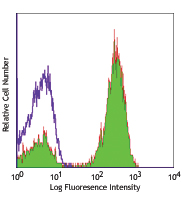
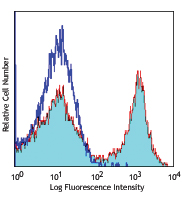
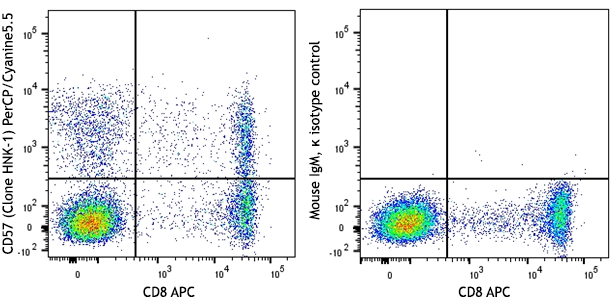
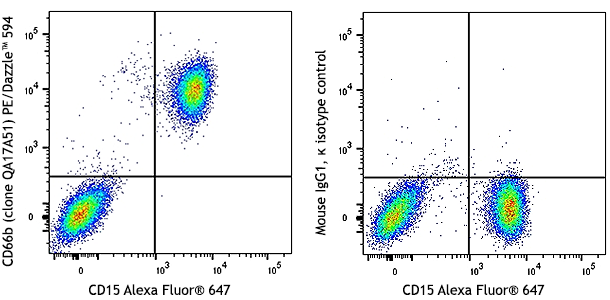



Follow Us